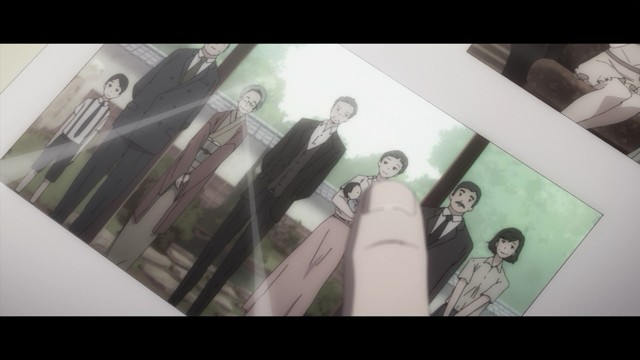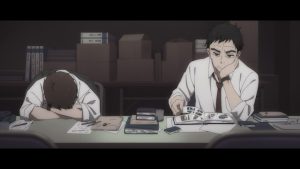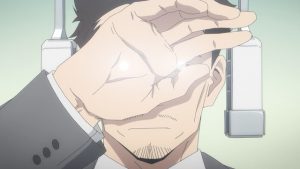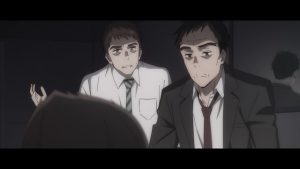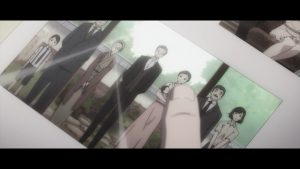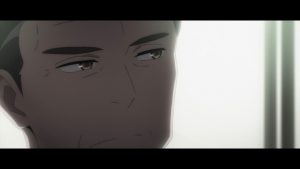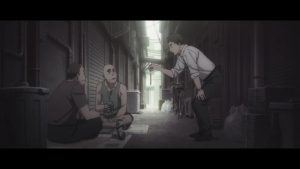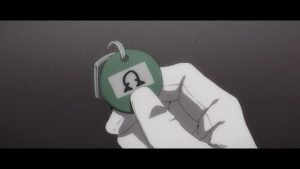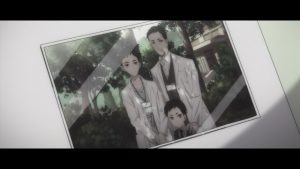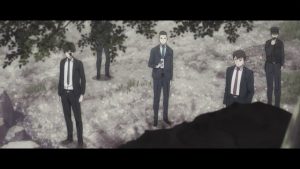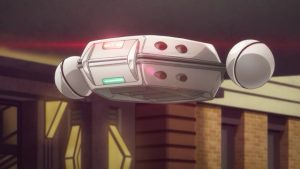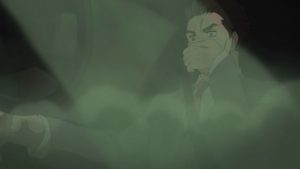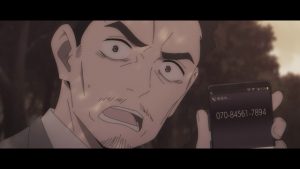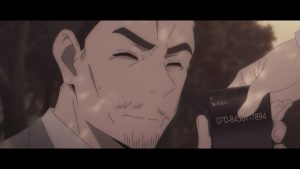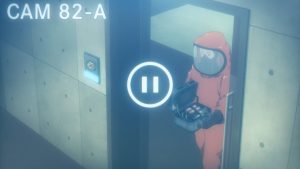 Well now, Fugou Keiji has certainly gotten rather juicy as it enters its third act. It’s always nice to see a series that’s wavering on the edge of coverage emerge as something really worthwhile, and it tends to happen a lot with this sort of offbeat, uncommercial effort. It also seems to happen a lot with Kishimoto Taku-written series, and that’s no coincidence – he tends to handle a lot of these unconventional adaptations that fill this slot on my schedule (most recently Kitsutsuki Tanteidokoro).
Well now, Fugou Keiji has certainly gotten rather juicy as it enters its third act. It’s always nice to see a series that’s wavering on the edge of coverage emerge as something really worthwhile, and it tends to happen a lot with this sort of offbeat, uncommercial effort. It also seems to happen a lot with Kishimoto Taku-written series, and that’s no coincidence – he tends to handle a lot of these unconventional adaptations that fill this slot on my schedule (most recently Kitsutsuki Tanteidokoro).
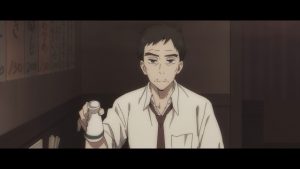 Make no mistake, there are a lot of very familiar elements to this story – it’s chock full of cop cliches. But this is a genre that’s so well-trod that the familiarity is one of its appeals – the key is in the execution. That’s been excellent for the last four episodes, especially in that all of them have been quite distinct stylistically. These characters are all fairly interesting takes on their archetypes, and the underlying mystery passes the sniff test (i.e., I’m curious enough to care about the solution).
Make no mistake, there are a lot of very familiar elements to this story – it’s chock full of cop cliches. But this is a genre that’s so well-trod that the familiarity is one of its appeals – the key is in the execution. That’s been excellent for the last four episodes, especially in that all of them have been quite distinct stylistically. These characters are all fairly interesting takes on their archetypes, and the underlying mystery passes the sniff test (i.e., I’m curious enough to care about the solution).
 Most of this ep takes place some 20 years in the past, where we find a younger Chou-san and Takei-san working together in the First Division. The case at the center of everything is, as expected, the murder of Daisuke’s mother. Chou-san is the senior figure here, which confirms that he was effectively exiled while Takei kept working his way up the ladder. Kishimoto is here too, as their supervisor, and we know before we’re told that he’s been exiled too. The Kanbe murder is a third rail of a case, but Chou-san is not a cautious man.
Most of this ep takes place some 20 years in the past, where we find a younger Chou-san and Takei-san working together in the First Division. The case at the center of everything is, as expected, the murder of Daisuke’s mother. Chou-san is the senior figure here, which confirms that he was effectively exiled while Takei kept working his way up the ladder. Kishimoto is here too, as their supervisor, and we know before we’re told that he’s been exiled too. The Kanbe murder is a third rail of a case, but Chou-san is not a cautious man.
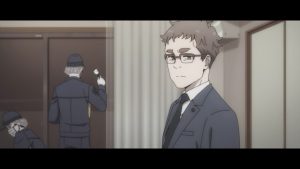 None of these people are angels – everyone has a selfish motive, and even anime-original Katou-san is inflexible and rather reckless. Chou-san is a cop who’s always been willing to bend the rules (he also spits out the chocolate “seeds” in his watermelon ice cream as if they were actually seeds), which had already stained his reputation even when we see him in flashback. Takei is marrying the director’s daughter, and it’s strongly implied (Chou says so outright) that he’s doing it to sleep his way to the top. And indeed, it seems it was his relationship with the director that insulated him when the hammer came down on Chou and Kishimoto-san (whose own hands are dirty, as he sold out Chou and Takei when they were on the brink of solving the case).
None of these people are angels – everyone has a selfish motive, and even anime-original Katou-san is inflexible and rather reckless. Chou-san is a cop who’s always been willing to bend the rules (he also spits out the chocolate “seeds” in his watermelon ice cream as if they were actually seeds), which had already stained his reputation even when we see him in flashback. Takei is marrying the director’s daughter, and it’s strongly implied (Chou says so outright) that he’s doing it to sleep his way to the top. And indeed, it seems it was his relationship with the director that insulated him when the hammer came down on Chou and Kishimoto-san (whose own hands are dirty, as he sold out Chou and Takei when they were on the brink of solving the case).
 Chou and Takei clearly believed Daisuke’s father was responsible for his estranged wife’s death, and his mother’s behavior does nothing to dispel that belief. Daisuke’s motivations are in laser focus now – he’s joined the force because he’s trying to solve his mother’s murder, and may suspect his father himself. The wild card here is that while the father supposedly killed himself as the net closed in, that may in fact have been staged – could he be running Kanbe Corporation from the shadows? I certainly wouldn’t say it’s impossible – in fact by genre trope, that would probably be the Occam’s Razor explanation.
Chou and Takei clearly believed Daisuke’s father was responsible for his estranged wife’s death, and his mother’s behavior does nothing to dispel that belief. Daisuke’s motivations are in laser focus now – he’s joined the force because he’s trying to solve his mother’s murder, and may suspect his father himself. The wild card here is that while the father supposedly killed himself as the net closed in, that may in fact have been staged – could he be running Kanbe Corporation from the shadows? I certainly wouldn’t say it’s impossible – in fact by genre trope, that would probably be the Occam’s Razor explanation.
 Takei is pretty obviously crooked, and his anxiousness to pin Imura-san’s death on Daisuke basically confirms he either staged it himself or at the very least knows who did and is trying to protect them. But while Daisuke, Chou and Katou have closed in on Takei, it’s too soon in the narrative for him to be the source of everything – he either doesn’t know the most important details, or he’s going to die before he can reveal them. This affair runs deep enough to where the security establishment itself is involved, so it seems pretty likely Daisuke isn’t going to like a lot of what he finds out (and finding it out will be very challenging, even for him).
Takei is pretty obviously crooked, and his anxiousness to pin Imura-san’s death on Daisuke basically confirms he either staged it himself or at the very least knows who did and is trying to protect them. But while Daisuke, Chou and Katou have closed in on Takei, it’s too soon in the narrative for him to be the source of everything – he either doesn’t know the most important details, or he’s going to die before he can reveal them. This affair runs deep enough to where the security establishment itself is involved, so it seems pretty likely Daisuke isn’t going to like a lot of what he finds out (and finding it out will be very challenging, even for him).


